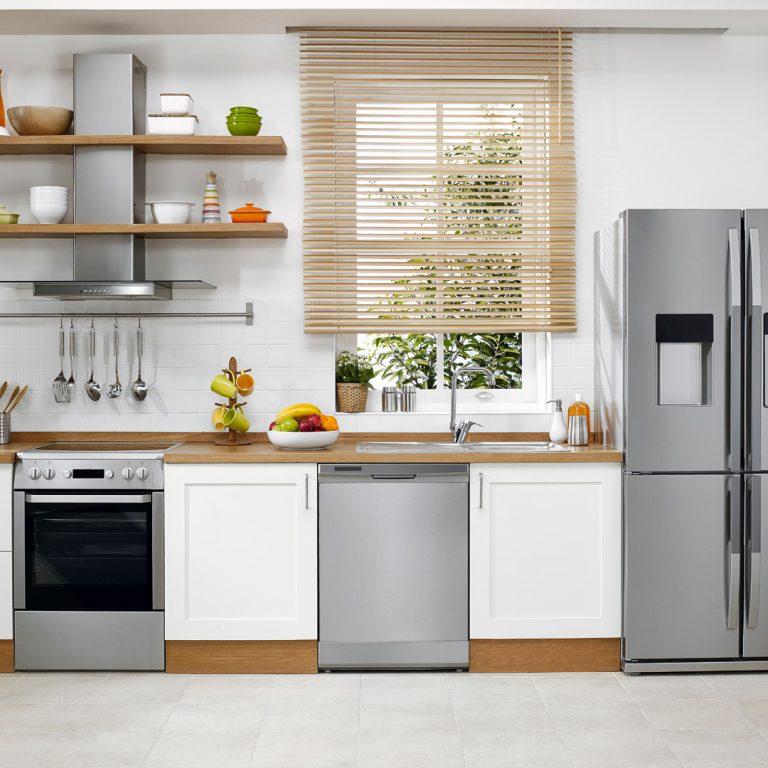The allure of shiny new appliances fills advertisements, TV shows and movies, all displaying gorgeous kitchens and laundry rooms that feature the latest models. Does all this beauty have you seriously thinking about upgrading the appliances in your home? Five factors can help you decide if this home improvement makes good financial sense.
1. The Age of Your Current Appliances
According to multiple sources, the life expectancy of most appliances is between 10 to 15 years, with refrigerators, gas stoves and dryers typically enjoying the longest lifespans (in some cases beyond 15 years) and dishwashers and microwaves often having the shortest ones.
The closer you get to the 10-year mark and beyond it, the greater financial justification you have to replace your current appliances because older ones are more likely to break down and require repair. Unless you have a home warranty, repairing an appliance can sometimes exceed its worth. Angi says the average fridge repair costs $200 to $300, but if the problem is with something like the control board or thermostat, the repair can easily exceed $400. Multiple breakdowns in a short time means you could quickly approach most or all of the cost of a new fridge in repair bills.
In addition to age, consider the physical condition of your appliances. If they are still in good shape even after years of ownership, maybe you can wait a little longer to replace them. On the other hand, if they have a lot of dents, scratches and other signs of years of use, you might want to move this home improvement project up on your priority list.
2. The Cost of Your Utility Bills
Older model appliances tend to be bigger energy hogs than newer ones, especially those that are ENERGY STAR certified. According to the EPA, choosing ENERGY STAR appliances, can save the typical household about $450 a year on energy bills.
Refrigerators are one of the biggest energy hogs in your home. The Department of Energy says that just replacing your old one with an ENERGY STAR model can “save you more than $230 over a 12-year lifetime.” You can easily determine how much your old fridge or freezer is costing you and find out how much you can save with an ENERGY STAR replacement by using the DOE’s Flip Your Fridge Calculator.
3. The State of Your Budget Versus the Upfront Investment
Would this purchase require a credit card charge that can’t be paid off with your next statement? Unless the money for this home improvement is already set aside, it’s financially smarter to identify new appliances as a future goal, and then start saving the money needed for the makes and models that you want. Here are few ideas to help you realize this goal:
- Adopt budget rules that clearly define how much you are going to save out of each paycheck.
- Open a savings account specifically earmarked for home improvements to keep you from spending the money you want to save for new appliances on other things.
- Take advantage of high-yield savings accounts or term accounts to help your money grow faster.
- Consider using a zero-based budget that identifies new appliances as an expense item to help “automate” saving for this purchase.
- Practice loud budgeting so friends and family know that saving for new appliances is your current priority instead of doing things like eating out or taking a trip.
4. Your Lifestyle and Need for Convenience
Assuming your budget isn’t an issue, factor in your lifestyle and the way that new appliances— specifically smart appliances—might make your daily routine easier and less stressful. Smart appliances connect to the internet and allow you to control them through your phone or other smart devices.
This means you can start your dishwasher, washing machine or dryer when you’re away from home. Some smart refrigerators can tell you what’s inside them so you know whether or not you need to stop by the grocery store on the way home from work. Smart ovens can preheat themselves, so all you have to do is pop your family’s meal inside when you get home.
Smart appliances are also energy efficient. For example, smart dishwashers and washing machines can determine how dirty your dishes or clothes are and automatically choose the most appropriate wash cycle so you don’t use any more water or energy than needed. This helps lower your utility bills.
5. The Potential Impact on Your Home’s Value and Buyer Appeal
Consumer Reports indicates that a full kitchen upgrade, including new appliances, can increase your home’s value between three and seven percent. If you’re just focused on new appliances, talk to a local realtor familiar with your neighborhood. They can give you feedback on how your existing appliances and/or replacements would affect their recommended sales price should you decide to list your home.
Interested in upgrading your appliances to luxury brands like Miele, Thermador or Viking? A realtor can also tell you if comparable homes in your area feature them so that you don’t price yourself out of the neighborhood with this type of purchase and get little return on your investment—something that doesn’t make great financial sense.






Comments Section
Please note: Comments are not monitored for member servicing inquiries and will not be published. If you have a question or comment about a Quorum product or account, please visit quorumfcu.org to submit a query with our Member Service Team. Thank you.